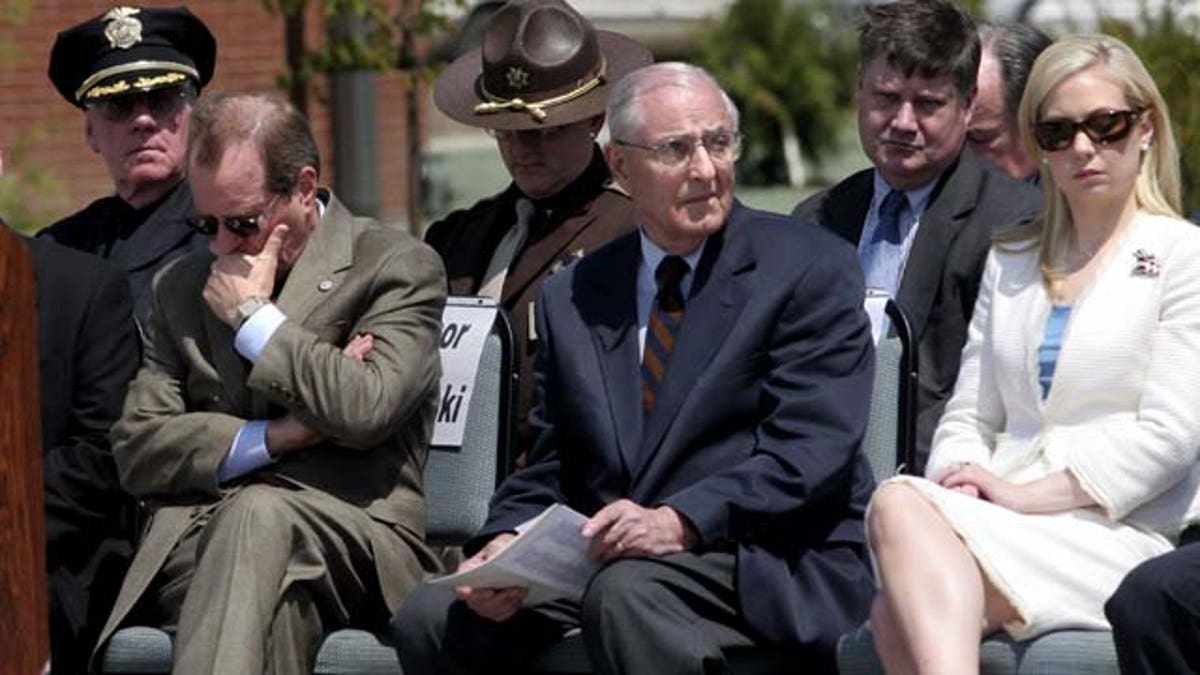
FILE - In this May 11, 2006, file photo, attending dignitaries including Oregon Gov. Ted Kulongoski, left, former Gov. Vic Atiyeh, center, and 2002 Miss America Katie Harmon sit, as the names of officers killed in the line of duty are read during the Oregon Law Enforcement Memorial ceremony at the new public-safety academy grounds in Salem, Ore. (AP Photo/Statesman-Journal, Thomas Patterson, File)
PORTLAND, Ore. – Vic Atiyeh, Oregon's last Republican governor who shepherded the state through a deep recession during two terms in the 1980s, died Sunday night, a family spokesman said.
The former governor died at 8:15 p.m. PDT at Portland's Providence St. Vincent Medical Center of complications from renal failure, said Denny Miles, who had formerly served as Atiyeh's press secretary.
He said that Atiyeh was at home but had returned to the hospital Saturday due to shortness of breath and possible internal bleeding.
The son of a Syrian immigrant, Atiyeh turned down an offer to play for the Green Bay Packers to take over his family's rug business. He entered politics in the Oregon Legislature, then ran for governor and won on a platform of cutting taxes.
He wound up raising taxes because of the recession, but was also remembered for cutting his own salary as governor three times to help balance the budget.
Atiyeh lamented the poor roll of the dice that made him governor during a recession.
"I don't want to sound defensive about it, but what you get is criticism during the period when times are bad, and then when times become good, it's just the nature of things," Atiyeh told an interviewer days before leaving office.
Democratic Gov. John Kitzhaber said Atiyeh was both a mentor and a friend, calling him "a great Oregonian, an historic governor, and a remarkable human being."
Kitzhaber added: "He will be greatly missed, yet his steady leadership, gentle spirit, and love for our state lives on in the many contributions he made to Oregon."
Atiyeh, a mainstream Republican who championed small state government and allowing citizens to be "left alone," lost his first run for governor in 1974 to Democrat Bob Straub. He challenged Straub again four years later and won, taking office in 1979 as Oregon underwent what was then its most severe recession since the Great Depression.
The state jumped from among the fastest growing in the country to one with a dwindling population as environmental regulations helped doom the once-mighty timber industry.
He championed a significant tax cut plan that included both a rebate and a permanent reduction. Within a year, as the recession took hold, some supporters of Atiyeh's tax plans had buyer's remorse as the state budget took a hit.
Atiyeh pushed Oregon's universities away from forestry, mining and agriculture to electrical engineering and international trade, and slightly boosted their budgets. The increase came partly at the cost of primary education, driving a wedge between Atiyeh and state teachers unions.
After a bruising campaign, Atiyeh defeated Ted Kulongoski, then a state senator, to be re-elected by 62 percent in 1982.
Atiyeh made frequent trips around Oregon, and was proud of having visited every county fair and every city in Oregon as governor.
His work on the environment evolved during his career. As a state senator, he sat on committees that drafted the state's clean air and water acts. But as governor, he supported timber interests in contentious debates about protections for spotted owls. He opposed any reduction in the acres of timber land open to logging.
In 1981, he reversed an earlier position to endorse a federal role in the Columbia Gorge, and together with former Sen. Mark O. Hatfield lobbied President Ronald Reagan to sign the National Scenic Area legislation.
Confined by term limits, he left in 1987 -- with little goodwill left to help elect another Republican. Democrat Neil Goldschmidt gleefully compared Republican rival Norma Paulus to the unpopular Atiyeh, winning the election on the slogan, "the same old Salem crowd."
To this day, Oregon hasn't elected another Republican to the governor's office.
After leaving office, Atiyeh retired, working part-time as a business consultant. He was a golfer, fly fisherman and collector of guns and memorabilia from the 1805 Lewis and Clark expedition.
For much of his life, he smoked two packs of cigarettes a day, and carried an elegant gold lighter.
Atiyeh married high school sweetheart Dolores in 1944. The couple had a daughter, Suzanne, and son, Thomas. They later raised several foster children.











































